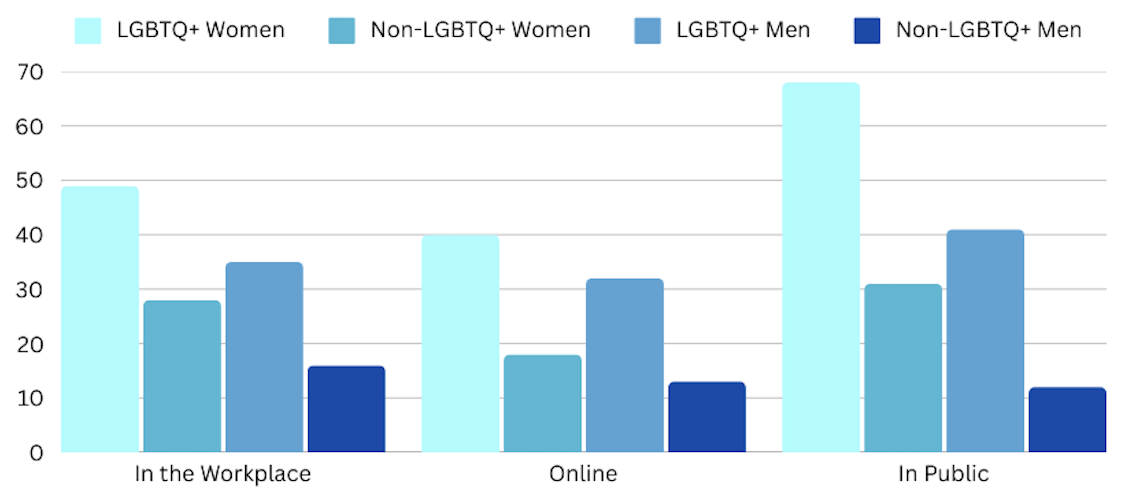Statistics from Canada.ca from an article on gender-based violence showing the difference in sexual harassment rates in of LGBTQ+ men and women, and non-LGBTQ+ men and women in percentages. Infographic by Tayson Prete.
According to Canada.ca, an estimated one million people living in Canada are lesbian, gay, bisexual or a sexual orientation that is not heterosexual (2SLGBTQ+), which makes up about four per cent of the population of Canada. One in two queer women and one in four queer men have reported having been a victim of sexual harassment.
Here at Lethbridge Polytechnic, although the statistics don’t reflect it, Carmen Guenther, manager of wellness services, says the numbers are likely higher than those reported.
“Although we have not noticed more 2SLGBTQ+ students come forward at our institution, we do know that students who identify as non-binary, trans or queer do have higher rates of violence against them,” says Guenther. “A sad truth is that reporting is not always safe for this population.”
According to the Sexual Assault Support Worker Handbook from the Ending Violence Association of BC, published in May of 2016, “When reporting incidents sexual assault to a counselor, police officer or medical personnel, 2SLGBTQ+ people often experience (or fear they will experience) homophobia and biphobia which deny the reality of lesbians, gay men’s and bisexual people’s lives, and also the seriousness of sexual assault when it happens.”
In the past, queer people have been seen as a threat to the modern family, labeled with all sorts of gross stereotypes designed to alienate them and ultimately make them seem like a joke to society
Steps and bounds have been made, especially in the past decade, to push for 2SLGBTQ+ rights. But due to the tribalistic nature of humanity, they will always be seen as different.
Some see different as something to be feared, but others see it as a novelty. A previous Polytechnic student, age 22, shared their experience with the online dating world, and the harassment they saw towards queer people.
“Almost every other person I run into while trying to date online has said something along the lines of ‘I’ve never slept with a non-binary person before,’” the former student says.
“Not only is it frustrating because feeling like people see me as a prize to be won because of my gender identity is a feeling that no person should have to endure, but the frequency that it happens is terrifying.”
These attacks create scars that never really heal. Scars that make queer people wonder what they did to be a victim. Scars that make them wish they weren’t the way they are. Scars that make them wish they were never born.
As the political climate drifts away from progress more and more, queer people are at more of a risk of harassment than they have been for years. Although there aren’t many ways to avoid it, there are ways to help cope with the ever-present anxiety.
Logan Gray is a queer post-secondary student who has found more than a few ways to deal with the stress that simply existing as a queer person in North America can bring. “Sometimes I need something that isn’t me, something positive,” says Gray. “I have to put trust in people that I know really care about me.”
They also express their worry that it is easy for queer people to get overwhelmed as stories of hatred towards the 2SLGBTQ+ community come across the news, creating even more distress and pain.
“If you get too overwhelmed by the world, just stop,” says Gray when asked what they would recommend doing when confronted with distressing stories of hate. “Take a whole day, don’t go on any social media platforms, make the active effort to avoid the news, check in with others, but most importantly, take care of yourself, and talk when you’re ready.”
For those who have been the victims of harassment because of their gender or sexuality, whether it be verbal, physical or sexual, Guenther and the rest of Wellness Services want you to know that you are never alone. There will always be support readily available to you.
“We want all our students to know that we are a safe place to come, and who you are, who you love and what you were doing at the time of your experience of violence does not matter,” says Guenther.
“Our supports are entirely student and survivor centered, so if you have experienced violence, we will always offer you options, but the choice will be yours as to how or if you want to proceed.”
Wellness Services and The Chinook Sexual Assault Centre are there to help you try to heal those scars. Call 403-320-3289 for Wellness Services, or 403-694-1094 for the Chinook Sexual Assault Centre.



